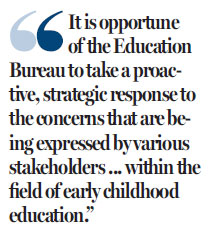'Real play' has an important role in early childhood development
Updated: 2016-07-27 07:25
By Dora Ho Choi-wa(HK Edition)
|
|||||||
At a consultation forum held on July 14, the Education Bureau sought public opinions on the proposed revisions to the Guide to the Pre-primary Curriculum (2006), a policy document setting the direction for future curriculum development for local preschools. The revised guide, to be issued in 2017, promotes the value of play; but the issue of how play can be used as pedagogy is barely mentioned. This has raised concerns among parents who have realized the significance of play to the healthy growth of children. Indeed, play acts as an indispensably important role in early childhood education and care. A large number of research studies about early childhood education, child development, and child care indicate that play can facilitate young children's learning and is beneficial for their personal growth.
In Chinese societies, play has been considered a waste of time and energy, and is believed to be harmful to learning. Hence we have the Chinese proverbs: "Riding a hobby saps one's will to make progress"; and "Progress in learning depends on diligent work rather than play". But in reality, contradictory to such traditional Chinese thinking, during play children have to come up with solutions when faced with problems. This propels their cognitive development. Also, when children engage themselves in interactive communication with peers, they will learn some new vocabulary. In addition, the social context of a play environment requires children to regulate their emotions and collaborate with others. To elaborate, during play, whether they play or fight, they will have to assume several roles - a friend, a protector, a defender, a judge, etc, and they will have to learn to empathize, analyze, assess, share and so on. This promotes children's affective, emotional and social development. Besides, playing involves physical activity and this improves their bodily development so children grow up healthy. In view of the advantages mentioned so far, play does not sap children's will but helps them to gain all-round personal development.
Shifting focus from playing with friends to that of play in the classroom, teachers should use "real play" or "realia" in the classroom. What is real play or realia? It is the use of real life objects that students can touch, feel, and even smell, using real life situations to teach children. More importantly, real play is a mode of discovery learning that acts as a vehicle for children to understand the world around them through a joyful process. It emphasizes not only children's creativity and enthusiasm during play but also the playfulness of the situation. However, right now in preschools children are not given enough opportunity to engage in real play and are often required to engage in pseudo-play. What is "pseudo-play"? Pseudo-play refers to the way some preschools or teachers attempt to use realia as a starter. However, the rest of the lesson follows a traditional and passive manner. This kind of fake play cannot truly motivate children as active learners. Real play, on the other hand, allows children to be involved in discovery learning, helps them understand the world around them and helps in whole-person development.
In order to enable children to have all-round personal development, early childhood educators, professionals and parents have to collaborate closely with each other to promote learning through play. In addition, early childhood organizations and preschools need to help parents understand the role, functions and importance of play for children's learning and development and promote home-school collaboration. They should develop a close partnership with parents and guide them to adopt play for positive parent-child relationship and to assist in family education. To promote playful learning, early childhood educators should show evidence that play can facilitate children's learning and development. They should promote it in such a way as to help change parents' negative attitudes toward play. As for parents, they need to communicate with preschools more, in order to understand that play is an effective pedagogy used in classrooms. Parents need to promote positive parent-child relationships and integrate play into family education. Before anything else, they should come to understand the value of play at a deeper level through home-school collaboration and through various other channels in daily life. Only then will they be able to interact with children in a meaningful way and help children's all-round development.
Play is an essential component of early childhood education and care. Play as an end not only entertains the little ones, but as a means also helps build a solid foundation for their life-long learning. There has been an enormous amount of research providing evidence that playing stimulates children to think, invent and create, explore the world around them, construct knowledge, and gain self-confidence. Playing is important to the physical, social, emotional, cognitive, creative and language development of young children. Having a happy childhood is the basic rights of every child in this world.
Using play as pedagogy in early childhood education and care has been attracting increasing attention in the local and global discourse on the development of young children. In order to respond to the changing local and global landscape and head up the future educational development of our young children in Hong Kong, it is opportune of the Education Bureau to take a proactive, strategic response to the concerns that are being expressed by various stakeholders including teachers, principals, parents, service providers and teacher educators within the field of early childhood education.
The author is associate professor and associate head, Department of Early Childhood Education, the Education University of Hong Kong (EdUHK); her co-author, He Pan, is master of education (early childhood education), EdUHK.

(HK Edition 07/27/2016 page10)